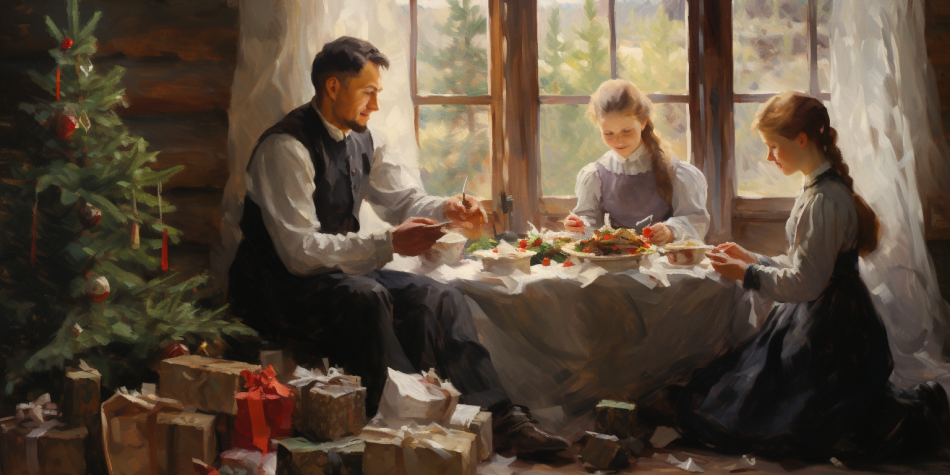Have you ever had a spiritual experience at an amusement park?
I do—every time I take my boys on our yearly pilgrimage to Lagoon—a fun spot in Utah my own grandparents and great-grandparents used to work at during the Depression.
One particular part of the day’s rhythm is where this beautiful, even transcendent moment always happens—right near the beginning of a ride. It starts when a look of pure delight appears on my boys’ faces.

The only thing that compares with it—with the possible exception of wrestling with my boys or serving them ice cream—is Christmas morning.
The delight of Christmas morning. No moment more quintessentially evokes the wonder and joy of childhood than daybreak on December 25th … after eleven months of anticipation.
And not just for the kids. Parents arise that morning having done whatever they can in the weeks leading up to make that morning special. I grew up with a father who went out shopping on Christmas Eve once for a few more presents—worried our young family didn’t have enough for the day to be magical for his children.
Many of us grapple with the opposite worry too—feeling concerned about too many presents and too much focus on those presents … coming away feeling at times like unwitting accomplices in the capitalist take-over of something sacred.
No doubt, this is something we should be paying attention to … the last thing our society needs today is more entitled children raised to be entitled adults. Whatever shortfalls exist in America today, this isn’t one of them.
But could we sometimes be overdoing the guilt on this question—so much so that we hardly even enjoy the celebration anymore? And amidst all the hand-wringing, could we also be missing the lessons of the joy on people’s faces—young and old—when a tender gift is received?
What if there’s something divine about that, too?
The joy of bringing joy. The spiritual glimpses at Lagoon were so profound that I found myself pondering it days afterward: How could I be so moved in a place literally dedicated to “amusing” people more?
Those four Littles following me everywhere were dependent on me for their well-being. Yet most days, that meant working enough hours, supporting my wife in the even harder work she did on a daily basis, getting them bathed, and hoping for a few minutes of time with Monique before we fell asleep exhausted.
But this day—shuttling them to their next favorite ride—my mind and heart could rest almost entirely on one thing: bringing happiness and sweetness to their lives.
“Let’s leave early enough to get there when the lines are short. Don’t forget your swimsuit! Anyone hungry yet? Are you sure you want to go on that one again? Let’s try to get one more ride in before the park closes!”
Of course, the number of rides isn’t really what matters here—nor is it the number of presents on Christmas morning. What’s most striking is the feeling that wells up inside on both occasions.
That glimpse of their faces as they board another ride. That curious smile as they open a present I’d planned for months … one more stroke on a Christmas morning canvas just right so it becomes a work of art.

In all this, it’s the joy of bringing joy into my children’s lives that overwhelms me. There was something undeniably divine in these moments—above and beyond—and quite independent of—all the encroaching profane consumerism.
It felt like I was experiencing a small piece of what my Father in Heaven—and yes, our Heavenly Parents—must experience as they do everything they can to bring to pass the joy, peace, and eternal life of their children.
This teaching can be a sticking point between our people and other Christians, and yet notice the common ground we also enjoy on this point, courtesy of Paul’s teaching to the Romans:
“The Spirit itself beareth witness with our spirit, that we are the children of God: And if children, then heirs; heirs of God, and joint-heirs with Christ; if so be that we suffer with him, that we may be also glorified together.”
And to the people of Corinth: “But as it is written, Eye hath not seen, nor ear heard, neither have entered into the heart of man, the things which God hath prepared for them that love him.”
While it’s true Latter-day Saints may interpret this differently than our evangelical friends, all Christian believers anticipate some pretty amazing things are up ahead for those who trust in Him enough to follow.
A “heavenly gift” Paul calls it to the Hebrews—adding to the Corinthians, “thanks be unto God for his unspeakable gift.”
Modern revelation to living prophets makes clear that joint-heirs really does mean “joint-heirs,” with the Lord promising His followers that “all things are theirs” if they yield their hearts on a covenant path that leads to “exaltation.”
Many of our Christian brothers and sisters aren’t ready to go there yet. But even if we can leave unspecified what’s underneath the wrapping, the prospect of an “unspeakable gift” God has prepared for those who love Him almost makes you a little giddy with anticipation, doesn’t it? Like a child on Christmas morning—albeit for something far better than gifts we’re used to giving each other. Consider the comparison:
- Offered freely—This is a “free gift” thanks to “the righteousness of one” and a feast provided “without money and without price.”
- Unlimited in supply—Rather than an exclusive item with a limited number before it sells out, Nephi describes the ready abundance of this gift in a society willing to receive it—“and they had all things common among them; therefore there were not rich and poor, bond and free, but they were all made free, and partakers of the heavenly gift.”
- Right to seek after. Aside from cute lists for Santa, most of us learn that seeking after gifts can be selfish. Yet we are encouraged to “seek earnestly” and “eagerly desire” what the Lord’s prophets call “the best gifts.” We are also encouraged to “lay hold upon every good gift, and touch not the evil gift.”
- Beautifully multifaceted. While Latter-day Saints consider eternal life itself as “the greatest of all the gifts of God”—that life (which Latter-day Saints understand to be a way of living that is how God lives) includes many beautiful facets. Like a diamond you can turn in various directions to see unique angles, the life God leads us into includes a “diversities of gifts” but the same Spirit—with various lists throughout scripture of the sacred gifts God invites us to pursue (healing, knowledge, faith, hope, tongues, charity, Holy Ghost).
“All these gifts,” the Lord says, “come from God for the benefit of the children of God.”
Of course, much of this will be nonsense to some, including some believers who insist that “the Lord no longer worketh … by gifts.”
If that, indeed, is what our lives feel like, then perhaps it says more about us than God. As Moroni taught, “If there be no faith among the children of men, God can do no miracle among them. … neither at any time hath any wrought miracles until after their faith; wherefore they first believed in the Son of God.”
“If these things have ceased,” Moroni’s father likewise points us back to our own “unbelief.”
The gift behind the gifts. There was a cost, of course, to this gift being provided to us all. “In the gift of his Son hath God prepared a more excellent way,” Moroni teaches, explaining how His coming to the world we celebrate this week “prepared a way that thereby others might be partakers of the heavenly gift.”
“Wherefore, ye may also have hope and be partakers of the gift,” he says directly to the reader, “if ye will but have faith.”
It all depends on our faith, as prophets, ancient and modern, have taught repeatedly. “Every good gift and every perfect gift” really does come “from above”—arriving in our hands and hearts from “the Father of lights.”
“All things” created in this beautiful world really do “bear record” of Him—perhaps even the fallible gifts we give each other on Christmas morning and other times in the year.
After all, if we, being prone to mischief, “know how to give good gifts unto [our] children,” then “how much more” does our Father of lights know how to “give good things” to all of us?
My witness is that the feeling you get in providing something beautiful to a loved one—along with that look on their face—symbolizes something higher. It bears witness to a reality even more wonderful than Christmas morning.
A reality that’s right up ahead for all who believe.

















